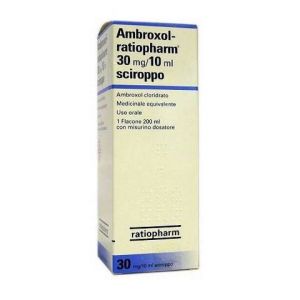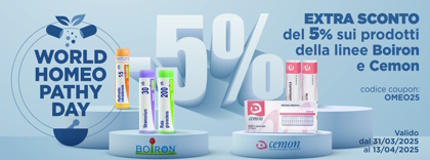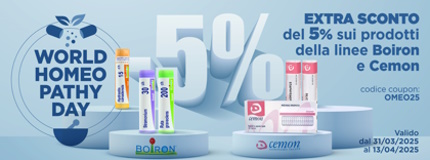Ship in Europe, Find out rates!
Language
Golasept Fatty Cough Syrup 200ml 30mg/10ml

Regular Price
€9.90
Special Price
€7.79
-21%
Save: €2.11
In stock
Recent lowest price:
€6.74
- box Delivery in Italy in 24/48 and free returns
- star3.000+ positive reviews
- dropboxOver 60,000 products in the catalog
Manufacturer
FARMAPRO
SKU
029152030
Active principle
AMBROXOLO CLORIDRATO
NAME
AMBROXOL-PHARMENTIS 3 MG / ML SYRUP
PHARMACOTHERAPEUTIC CATEGORY
Expectorants, excluding associations with cough suppressants; mucolytics.
ACTIVE PRINCIPLES
100 ml of syrup contain: ambroxol hydrochloride 300 mg.
EXCIPIENTS
Hydroxyethylcellulose; sorbitol 70%; glycerol; benzoic acid; black cherry aroma; propylene glycol; tartaric acid; purified water.
INDICATIONS
Treatment of respiratory diseases characterized by thick and viscous hypersecretion.
CONTRAINDICATIONS / SECONDARY EFFECT
Hypersensitivity 'to the active substance or to any of the excipients. Severe hepatic and / or renal disorders. The medicine is contraindicated in children younger than 2 years.
DOSAGE
Adults: 10 ml (30 mg) 3 times a day. Children over 5 years: 5 ml (15 mg) 3 times a day. Children 2 to 5 years: 2.5ml (7.5mg) 3 times a day. Method of administration It is recommended to take the syrup after meals. Do not use for prolonged treatments.
STORAGE
Do not store above 25 degrees C.
WARNINGS
Ambroxol should be administered with caution to patients with peptic ulcer. There have been reports of severe skin reactions such as erythema multiforme, Stevens-Johnson syndrome (SJS) / toxic epidermal necrolysis (TEN) and acute generalized exanthematous pustulosis (AGEP) associated with the administration of ambroxol hydrochloride. Most of these cases can be explained by the severity of the patient's underlying disease and / or by concomitant therapy. Also, during the initial phase of Stevens-Johnson syndrome or TEN, patients may experience nonspecific flu-like prodromes such as fever, body aches, rhinitis, cough and sore throat. Because of these misleading nonspecific flu-like prodromes, symptomatic treatment with cough and cold medications may be instituted. If symptoms or signs of progressive skin rash (sometimes associated with blistering or mucosal lesions) are present, treatment with ambroxol hydrochloride should be stopped immediately and a physician consulted. In the presence of mild or moderate severe renal insufficiency, the drug should be used only after consulting your doctor. In case of severe renal insufficiency, accumulation of the metabolites of ambroxol generated in the liver may occur. Due to the sorbitol present in the formulation, people with rare hereditary forms of fructose intolerance should not take this medicine. The amount of sorbitol contained in this medicinal product may cause a mild laxative effect. The caloric value of sorbitol is 2.6 kcal / g. Pediatric population: mucolytics can induce bronchial obstruction in children younger 'less than 2 years. In fact, the drainage capacity of the bronchial mucus is limited in this age group, due to the physiological characteristics of the respiratory tract. They should therefore not be used in children younger 'less than 2 years.
INTERACTIONS
Following the administration of ambroxol the concentrations of antibiotics (amoxicillin, cefuroxime, erythromycin) in bronchopulmonary secretions and saliva are increased. No clinically relevant adverse interactions have been observed with other medicinal products.
SIDE EFFECTS
Undesirable effects listed by frequency are reported, using the following convention: very common (> = 1/10); common (> = 1/100, <1/10); uncommon (> = 1 / 1,000, <1/100); rare (> = 1 / 10,000, <1 / 1,000); moltoraro (<1 / 10,000). Disorders of the immune system. Rare: hypersensitivity reactions; not known: anaphylactic reactions, including anaphylactic shock, angioedema and pruritus. Nervous system disorders. Common: dysgeusia (eg changes in the sense of taste); rare: headache. Respiratory, thoracic and mediastinal disorders. Common: hypoesthesia of the oral cavity and pharynx; rare: rhinorrhea; not known: bronchial obstruction. Gastrointestinal disorders. Common: nausea; uncommon: vomiting, diarrhea, dyspepsia and abdominal pain, dry mouth; rare: heartburn, constipation; not known: dry throat. Skin and subcutaneous tissue disorders. Rare: rash, urticaria, contact dermatitis; unknown: severe cutaneous adverse reactions (including erythema multiforme, Stevens-Johnson syndrome / toxic epidermal necrolysis and acute generalized exanthematous pustulosis). Renal and urinary disorders. Rare: dysuria. General disorders and administration site conditions. Rare: fatigue. Report any suspected adverse reactions via the reporting system.
PREGNANCY AND BREASTFEEDING
Ambroxol hydrochloride crosses the placental barrier. Animal studies have shown no direct or indirect harmful effects on pregnancy, embryonal / fetal development, parturition or postnatal development. Clinical studies and extensive clinical experience after the 28th week of pregnancy did not show any evidence of harmful effects on the fetus. However, it is recommended to observe the usual precautions regarding the use of medicines during pregnancy. Particularly during the first trimester, use is not recommended. Ambroxol hydrochloride is secreted in breast milk. Although undesirable effects on infants are not expected, the use of the drug is not recommended in nursing mothers.
AMBROXOL-PHARMENTIS 3 MG / ML SYRUP
PHARMACOTHERAPEUTIC CATEGORY
Expectorants, excluding associations with cough suppressants; mucolytics.
ACTIVE PRINCIPLES
100 ml of syrup contain: ambroxol hydrochloride 300 mg.
EXCIPIENTS
Hydroxyethylcellulose; sorbitol 70%; glycerol; benzoic acid; black cherry aroma; propylene glycol; tartaric acid; purified water.
INDICATIONS
Treatment of respiratory diseases characterized by thick and viscous hypersecretion.
CONTRAINDICATIONS / SECONDARY EFFECT
Hypersensitivity 'to the active substance or to any of the excipients. Severe hepatic and / or renal disorders. The medicine is contraindicated in children younger than 2 years.
DOSAGE
Adults: 10 ml (30 mg) 3 times a day. Children over 5 years: 5 ml (15 mg) 3 times a day. Children 2 to 5 years: 2.5ml (7.5mg) 3 times a day. Method of administration It is recommended to take the syrup after meals. Do not use for prolonged treatments.
STORAGE
Do not store above 25 degrees C.
WARNINGS
Ambroxol should be administered with caution to patients with peptic ulcer. There have been reports of severe skin reactions such as erythema multiforme, Stevens-Johnson syndrome (SJS) / toxic epidermal necrolysis (TEN) and acute generalized exanthematous pustulosis (AGEP) associated with the administration of ambroxol hydrochloride. Most of these cases can be explained by the severity of the patient's underlying disease and / or by concomitant therapy. Also, during the initial phase of Stevens-Johnson syndrome or TEN, patients may experience nonspecific flu-like prodromes such as fever, body aches, rhinitis, cough and sore throat. Because of these misleading nonspecific flu-like prodromes, symptomatic treatment with cough and cold medications may be instituted. If symptoms or signs of progressive skin rash (sometimes associated with blistering or mucosal lesions) are present, treatment with ambroxol hydrochloride should be stopped immediately and a physician consulted. In the presence of mild or moderate severe renal insufficiency, the drug should be used only after consulting your doctor. In case of severe renal insufficiency, accumulation of the metabolites of ambroxol generated in the liver may occur. Due to the sorbitol present in the formulation, people with rare hereditary forms of fructose intolerance should not take this medicine. The amount of sorbitol contained in this medicinal product may cause a mild laxative effect. The caloric value of sorbitol is 2.6 kcal / g. Pediatric population: mucolytics can induce bronchial obstruction in children younger 'less than 2 years. In fact, the drainage capacity of the bronchial mucus is limited in this age group, due to the physiological characteristics of the respiratory tract. They should therefore not be used in children younger 'less than 2 years.
INTERACTIONS
Following the administration of ambroxol the concentrations of antibiotics (amoxicillin, cefuroxime, erythromycin) in bronchopulmonary secretions and saliva are increased. No clinically relevant adverse interactions have been observed with other medicinal products.
SIDE EFFECTS
Undesirable effects listed by frequency are reported, using the following convention: very common (> = 1/10); common (> = 1/100, <1/10); uncommon (> = 1 / 1,000, <1/100); rare (> = 1 / 10,000, <1 / 1,000); moltoraro (<1 / 10,000). Disorders of the immune system. Rare: hypersensitivity reactions; not known: anaphylactic reactions, including anaphylactic shock, angioedema and pruritus. Nervous system disorders. Common: dysgeusia (eg changes in the sense of taste); rare: headache. Respiratory, thoracic and mediastinal disorders. Common: hypoesthesia of the oral cavity and pharynx; rare: rhinorrhea; not known: bronchial obstruction. Gastrointestinal disorders. Common: nausea; uncommon: vomiting, diarrhea, dyspepsia and abdominal pain, dry mouth; rare: heartburn, constipation; not known: dry throat. Skin and subcutaneous tissue disorders. Rare: rash, urticaria, contact dermatitis; unknown: severe cutaneous adverse reactions (including erythema multiforme, Stevens-Johnson syndrome / toxic epidermal necrolysis and acute generalized exanthematous pustulosis). Renal and urinary disorders. Rare: dysuria. General disorders and administration site conditions. Rare: fatigue. Report any suspected adverse reactions via the reporting system.
PREGNANCY AND BREASTFEEDING
Ambroxol hydrochloride crosses the placental barrier. Animal studies have shown no direct or indirect harmful effects on pregnancy, embryonal / fetal development, parturition or postnatal development. Clinical studies and extensive clinical experience after the 28th week of pregnancy did not show any evidence of harmful effects on the fetus. However, it is recommended to observe the usual precautions regarding the use of medicines during pregnancy. Particularly during the first trimester, use is not recommended. Ambroxol hydrochloride is secreted in breast milk. Although undesirable effects on infants are not expected, the use of the drug is not recommended in nursing mothers.

